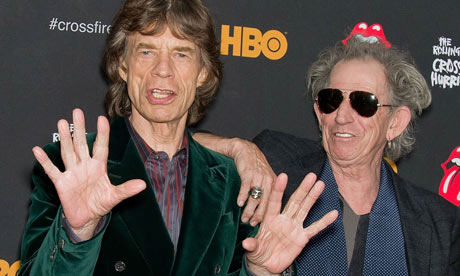
Fat isn't just a feminist issue. Ever since Liam Gallagher branded Robbie Williams "the fat dancer from Take That", while Robbie sneered at Liam's brother Noel's "man boobs", and perhaps even before this venerable feud, the sexual desirability of adiposity among men has been questionable. Fattist slurs between pop icons only work because they're underpinned by a truth surely universally acknowledged: ladies don't dig fleshy dudes.
Rather, according to the once-popular immunocompetence handicap hypothesis (IHH), what women want from male sexual partners is a chiseled jaw, abs like fossilised chipolatas and, most likely, a set of free weights that aren't collecting dust under the bed. Think Brad Pitt making Gina Davis drool in Thelma and Louise, rather than his hilarious recent monologue in that perfume ad.The IHH claimed that real men produce a lot of testosterone but that interferes with the workings of their immune systems, so they have to be super-fit to withstand handicap of over-producing that masculinsing hormone. Women are attracted to just such men, then, because their unremitting machismo betokens health.
According to this account of sexual desire, women – even clever ones – aren't put off real men by the fact that such buffness demands narcissistic levels inimical to rewarding romantic liaisons and/or sexual encounters. That, to my mind, has always been the IHH's fatal flaw.
Now, thankfully, comes a challenge to this hypothesis. It gives hope to those men with negligible muscle tone, tummies as hollow as your cheeks, and whose morning regimen consists of choosing between 27 pairs of skinny jeans to a soundtrack of Nick Drake's gaunter works. It also explains why I model myself on Don Quixote rather than Ignatius P. Reilly.
Twenty-nine heterosexual Latvian women in the fertile phases of their menstrual cycles (is it just me who loves sentences that start like that?) were asked by researchers at the University of Pretoria to look at photographs of 69 men of varying body-mass indices in their underwear and rate them for attractiveness. Tough gig. What sort of underwear, you ask. That's not important now. It might well be, you quite sensibly retort. Why South African researchers used Latvian women is also a puzzle.
Pressing on. Of the photographed male volunteers, the adipose ones were quickly discounted by the women because, researchers concluded, fatter men have weaker immune systems and are therefore less fanciable. Better that Barry White is dead than he read such rubbish.
But the really surprising finding was that, as one headline put it: "Ladies prefer thin over macho". Is this because of the truth of my Buff Narcissist Caveat? Sadly no. It's because thinness, so suspiciously regarded historically by evolutionary biologists, turns out to be a better indicator of immunity and thus sexual attractiveness.
The study raises questions. Can we extrapolate from the subconscious desires of hormonally challenged Latvian women to a global account of what kind of men women want? Doesn't the fact that all the study's volunteers were Caucasian confound the theory's more general applicability? How thin can one be and still be attractive to possibly hotsy-totsy women from a Baltic state? As thin as Christian Bale in The Machinist? Really? Do women fancy heroin-addicted Ewan McGregor in Trainspotting more than his later, chunkier incarnations and, if so, doesn't that show how sick and weird women are? Don't evolutionary biologists' treatments of the mysteries and intermittencies of the human heart seem intolerably glib?
But forget about those questions. The study seems to provide scientific underpinning for Mick and Keef's half century of sexual success. It also confirms a prevailing aesthetic. Inside every Calista Flockhart, there's a little guy trying to get out in an oversized raincoat and matchstick legs, probably to form a grisly indie band and drive girls nuts. There has also been a rise in what's facetiously called manorexia as some men strive to adhere to the second part of Wallace Simpson's stern dictum "You can never be too rich or too thin."
But still. If Pretorian scientists are right, and they probably aren't, thin is what women want. And if that's what they want, those who want them had better get used to supplying it.

